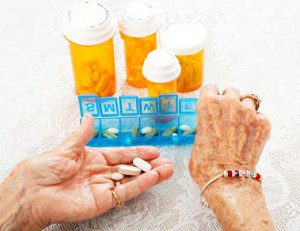The growing population of older adults who are taking many medications prescribed by different doctors, combined with the growing opioid epidemic, is contributing to the increasing problem of drug misuse among the elderly, according to Harry Hanoutunian, MD, Director of the Professional Program at the Betty Ford Center.
Join Together asked Dr. Haroutunian about how children and caregivers of older adults can recognize drug misuse, how they can differentiate it from signs of normal aging, and what they can do about it. Dr. Haroutunian is the author of Not As Prescribed: Recognizing and Facing Alcohol and Drug Misuse in Older Adults.
Why is the rate of drug misuse rising among older adults?
Dr. Hanoutunian: An estimated 10,000 people per day are turning 65 in the United States. Many of them visit different providers to treat different problems, so they end up with a combination of pills (called polypharmacy), each with their own side effects. They don’t have anyone monitoring all of the drugs they are taking. They may be taking different drugs from different doctors to treat the same condition.
We are also caught up in the middle of an opiate epidemic, and many older people have pain that is being treated with dangerous drugs.
The problem isn’t all due to prescription drugs. Some of the most common over-the-counter drugs can cause memory problems, such as antihistamines like Benadryl, Advil PM and Tylenol PM.
How can you tell if your parent’s memory loss or odd behavior may be due to normal aging, dementia or mixing of prescription drugs?
Dr. Haroutunian: That is almost impossible to evaluate so long as a patient is taking a steady stream of medication combinations on a daily basis. A caregiver should work with their doctor to do an assessment of all medications the patient is taking—including over-the-counter medications and supplements. Bring everything to the doctor’s office for a thorough medication audit.
Most major medical centers have memory evaluation clinics. They will first wean the person off all medications, and then conduct the testing. This can often distinguish benign memory problems, which are a normal part of the aging process, from dementia.
What is the best way to approach a parent if you think they need help weaning off painkillers?
Dr. Haroutunian: Taking too many painkillers can cause forgetfulness like leaving the stove or iron on. The disease of addiction can sneak into this situation quietly, and can escalate in no time at all. Your mother can be taking Vicodin for pain, and having a glass or two of sherry in the afternoons, and when no one is around she falls and breaks her hip.
If you are concerned about your parent’s use of painkillers, you will need the doctor’s help to do an accurate assessment of how much they are taking. With this information, the doctor can predict whether the person can be safely tapered from the medication, or whether they will likely exhibit some withdrawal effects. Weaning someone off pain medication should always be done under medical supervision—you should never just hide the pain pills.
Why is it so important to catch an older person’s polypharmacy early?
Dr. Haroutunian: Many signs that people assume are those of early aging, such as memory loss, forgetfulness, and the inability to perform tasks of daily living, could be caused by medication. We want to catch this at an early stage, before this combination of drugs affects the organs, particularly the liver. What we take yesterday may still be in our system today, and taking more every day has an additive effect. It taxes the liver’s ability to detoxify the body.
What words of advice do you have for caregivers of older adults who are concerned about their loved one’s medication use?
Dr. Haroutunian: Aging is not a disease. Older people deserve the right to live their golden years in a state of awareness and vibrancy. They shouldn’t be in bed taking different medications. After caring for my mother in my home for 25 years, I experienced the beauty and joy of seeing her in vibrant health, and the meaningful work that was required when her health was failing. I commend all caregivers in doing this noble task. I wish them a sense of awareness that keeps their loved ones as safe as possible.
Published
April 2016
 Get Support
Get Support

